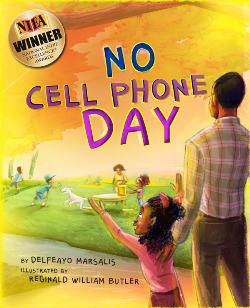
When I was approached about reviewing No Cell Phone Day I will confess that I jumped to the conclusion that it was about getting your teenagers off their phones. While the concept could certainly apply to teenagers, No Cell Phone Day is a children’s picture book that explores the idea of PARENTS and their children committing to a no technology day and how that could benefit their relationship.
No Cell Phone Day is written by world-renowned NEA Jazz master and Grammy award-winning producer, Delfeayo Marsalis and illustrated by award-winning Harlem artist, Reginald Butler. The story follows Delfeayo and his daughter through their decision to put down their cell phones for a day to explore their hometown of New Orleans. The end result is their time together becomes quality time.
This charming story would be a fun read with your child and a great way to prepare for your own No Cell Phone Day. If you’re like me, the idea will make you nervous, maybe even anxious – I don’t think I would commit to leaving my cell phone at home as I am very dependent on it and especially when I’m travelling as I like to check bus/train schedules, maps and locations, for example. However, I would consider to not checking my emails and not responding to phone calls.
I also know that access to a phone/cell phone can also be a contentious issues in separated families so I asked Delfeayo for his input on handling a few situations:
Mandy: Parenting plans often include requirements about allowing phone contact between a child and their other parent during a parent’s parenting time. Sometimes these requirements are vague, such as reasonable contact while other times, they can be very specific. How would you recommend approaching No Cell Phone Day with your child’s other parent?
Delfeayo: Although I myself have never been divorced, I have encountered divorced couples on various occasions (and seen Divorce Court a few times). The biggest setback is the lack of willingness of one or both parents to play fair. I guess if communication was good during the marriage, it wouldn’t have ended up in divorce, so why expect more after it’s over? But, in the end it comes down to communication. I would tell the parent (or text her!) the game plan upfront. “Joseph will not be using his cell phone today, but he’ll call you from a landline at 3 pm and again at 6 pm, etc.” The great thing about landlines in public is that no one wants to linger. Find out where pay phones are located or identify businesses that will allow you to make a personal call. The key to having a good No Cell Phone Day is to plan in advance before you leave the house, like folks used to do!
Mandy: Telling your child that they can’t use their phone to contact or respond to their other parent may put your child in a difficult situation of choosing between the competing requests of their parents. They may see this as not being able to make both parents happy – whatever they do they will make one parent unhappy. Harder still, your child may not tell you this. How do you suggest handling this?
Delfeayo: The important point to make clear is not that the child cannot use the cell phone to contact the other parent, rather that the cell phone will be turned off so as not to hinder quality family time together. Make plans when the child will call the other parent and stick to it, but decide in advance the time and length of call. Fair game is fair game. If a parent only sees the child on the weekends, then clearly the other parent should not require more than one 10-15 minute call per day. That seems reasonable to me.
Mandy: What if your child goes along with no cell phone day without raising any objections but gets to their other parent’s and says, “Well, mom/dad wouldn’t let me use my phone.” What would you recommend to help prevent this situation from arising? Are there any signs that might alert you that this could be a possibility?
Delfeayo: Again, the issue here is communication. I would personally make my intentions very clear so as to not instigate an argument or disagreement. It’s unreasonable for the other parent to demand the cell phone be on at all times for the convenience of calling on a whim. Just like the courts dictate how many days will be shared, the parents can come to an agreement on the time and length of phone calls in advance.
And in case you need more persuasion to give this a go, a final few words …
Delfeayo: Ask your child what is the greatest memory (or 3 or 5) of his/her life to date. None of them will involve a cell phone. Then ask what are the greatest 3-5 experiences involving the cell phone. Chances are the 3-5 greatest will involve something that the child actually participated in, whereas the cell phone greats will probably be videotaping someone else doing something. No one will ever report their greatest memory being while talking on a cell phone, no matter how many hours a day they spend on it.
***
Disclosure: I received a complimentary review copy of this book and have donated it to the non-profit Children’s First Of The Rockies which provides supervised visits and exchanges to children in high-risk/high conflict families.